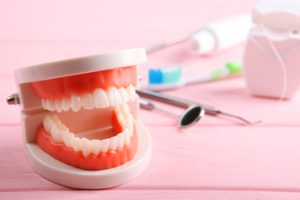How Long Do Dentures Last? Maximise the Life of Dentures

Missing teeth can be an embarrassing issue. They can also make it hard to eat, speak, and smile. Fortunately, dentures provide an affordable and effective solution for those missing teeth. But how long do dentures last?
What are dentures?
Dentures are artificial replacements for teeth and surrounding tissue. They can be either partial (replacing just a few missing teeth) or full (replacing all of your teeth). Dentures are usually made from acrylic resin, although some may also have metal components.
Types of dentures
Not all dentures are the same—there are several types to choose from. Here’s a quick overview of the four major types of dentures so you can decide which one is best for you.
Partial dentures
Partial dentures are a great option for people who still have some healthy natural teeth. These are false teeth that replace only the ones that are missing so your existing teeth stay in place. They come in two parts: a flesh-coloured base that fits around your gums and clips onto your remaining natural teeth; and plastic or porcelain false teeth that sit on top of the base. With proper care and maintenance, partial dentures can last up to five years before they need to be replaced or adjusted.
Complete dentures
Complete dentures are used when all the upper or lower teeth have been lost due to injury, decay, or age-related tooth loss. These dentures look like a full set of natural-looking false teeth that rest on top of the gums and attach with dental adhesive. They’re held in place by your jawbone structure and the suction created between the gums and palate (roof of your mouth).
Complete dentures should be replaced every 5–7 years as they wear out over time due to normal use.
Immediate dentures
Immediate dentures are similar to complete dentures, except they’re placed immediately after your damaged or missing teeth have been removed by your dentist instead of waiting for your gums to heal first. This means you won’t have any gaps in your smile during the healing process but will need more frequent adjustments as soon as your gums start shrinking during healing. Immediate denture wearers should expect regular visits with their dentist for relines (adjustments) throughout their lifespan until a new set is ready for placement at 5–7 years post-insertion date.
Implant-supported dentures
For those seeking a more permanent solution than traditional partial or complete denture wearers, an implant-supported denture may be an option worth considering. These prosthetics use dental implants at strategic points within the mouth as anchors while securely attaching artificial prosthetic teeth on top of them via abutment connections just like crowns do with root canal posts inside a tooth root structure — forming one full arch fixed into place permanently with bone grafting if needed prior to implant placement depending on individual cases. As these prostheses require surgical intervention upfront, they cost much more than traditional non-implant retained partial and complete prostheses do but offer longer lasting results due to no further relining needs being required over time, making them well worth this additional initial cost for many patients who opt for this type of tooth replacement solution.
What is the denture process like?
Step one: Determining your needs
The first step in the dentures process is for your dentist to determine what type of dentures are best for meeting your needs. Depending on how many teeth are missing and their location, your dentist may recommend full or partial dentures, implant-supported dentures, or even dental implants. They will also take into account factors such as your budget and lifestyle. Your dentist will discuss all these options with you and help you choose the right solution for your individual needs.
Step two: Taking impressions
Once you have decided on the kind of denture that is best for you, the next step is to take impressions of your mouth. These impressions are used to create a model of your mouth so that a lab technician can make an accurate set of dentures that fit perfectly in your mouth and feel comfortable when worn. During this appointment, you’ll also get tips from your dentist on how to properly care for your new dentures.
Step three: Fitting and adjustments
When the new set of dentures arrives from the lab, it’s time for another appointment with your dentist to ensure they fit correctly and do not cause any discomfort or irritation in your mouth. At this fitting appointment, any necessary adjustments will be made so that the fit is perfect before they become part of your daily routine. The last thing anyone wants is a set of ill-fitting adult braces!
How long do dentures last?
Dentures can last anywhere from five to fifteen years with proper care, maintenance and regular check-ups. It is important for denture wearers to take their dentures in for adjustment or repair as soon as normal wear and tear become noticeable.
Tips for making your dentures last longer
Below are some useful tips on how to make your dentures last longer.
Clean and care for your dentures regularly
Just like natural teeth, dentures need to be cleaned every day with a soft-bristled toothbrush. Using a mild soap and warm water will help keep them clean and free of plaque buildup and bacteria. Don’t forget to brush your gums, tongue, and the roof of your mouth—all of these areas need attention too! Be sure to rinse the dentures thoroughly after cleaning them.
Store your dentures properly when not in use
Whenever you take out your dentures at night or during the day, it is important that you store them properly in a container filled with water or a cleaning solution recommended by your dentist. This will help keep them from becoming brittle and drying out. It is also important to remember not to use hot water when storing them since this can cause the material of the denture to warp or even break.
Nutritional considerations
Your diet plays a crucial role in keeping your mouth healthy while wearing dentures. Avoid eating foods that are chewy, tough, or hard, as these can put a strain on the appliance and cause it to break down faster than expected. Also, try to avoid sticky foods like caramel or taffy, as these can pull at the adhesives used to keep them in place in your mouth. Instead, try softer foods like cooked vegetables, mashed potatoes, fish, scrambled eggs etc. and make sure you chew slowly and carefully so as not to loosen them from their adhesive grip in your mouth.
Visit your dentist regularly
Your dentist should check your dentures at least once a year or more often if needed. During these visits, they will check for any signs of wear and tear or other damage that may have occurred over time due to regular use. They may also suggest relining or rebasing your denture if it has become loose due to changes in your mouth over time. This will help ensure that it fits properly and comfortably again while helping it last longer too!
Benefits of dentures
1. Improved appearance – Dentures can drastically improve your appearance and give you back your confidence. With dentures, you can have a full set of natural-looking teeth that will help you look younger and more vibrant. They also fill out sunken cheeks and give a fuller facial appearance.
 2. Easier eating – Dentures can make eating easier as they replace missing teeth and provide support to the face and lips, so chewing is more efficient and comfortable. With dentures, foods such as nuts, apples, corn on the cob, and steak are no longer off-limits!
2. Easier eating – Dentures can make eating easier as they replace missing teeth and provide support to the face and lips, so chewing is more efficient and comfortable. With dentures, foods such as nuts, apples, corn on the cob, and steak are no longer off-limits!
3. Improved speech – Missing teeth can cause slurring or mumbling when speaking due to a lack of support for lips and tongue. Dentures can restore speech by providing support for these areas, which helps form words better when speaking clearly.
4. Better oral health – Dentures help maintain bone structure in the jaw, which keeps remaining teeth from shifting out of alignment or becoming loose due to a lack of support from surrounding teeth. This helps maintain good oral hygiene since crooked or loose teeth are harder to clean properly than straight ones.
5. Reduced risk of gum disease – Gaps between teeth create pockets where food particles get stuck easily, leading to gum disease, which affects overall health conditions in the long run if left untreated, so replacing missing teeth with dentures reduces the risk of gum disease significantly by keeping food particles away from gums while eating and talking thus promoting healthy gums and supporting overall wellbeing and quality of life!
6 . Comfort – The material used for making dentures is specially designed for maximum comfort and durability; this means that the denture wearer won’t feel any discomfort while wearing it as it fits perfectly well into the mouth cavity without causing any irritation even after long hours of wear and tear.
Get quality dentures at My Local Dentists
At My Local Dentists, we take pride in providing our patients with high-quality dentures that look and feel natural. We understand the importance of having a great smile that you can be confident in, which is why we offer a variety of options to choose from. Our team of skilled dentists is here to help you find the perfect set of dentures for your individual needs and budget. Contact us now to book your appointment online to get started!
References
What Are Dentures
https://www.colgate.com/en-in/oral-health/dentures/what-are-dentures
Dental Health and Dentures
https://www.webmd.com/oral-health/dental-health-dentures
